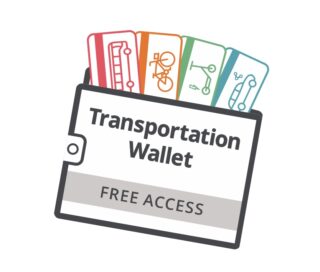How can a city encourage affordable housing residents to use transit and shared bikes and scooters more often? Results from an ongoing Portland Bureau of Transportation pilot program and a new report from Portland State University suggest one way to do it: make it free.

(Graphic: City of Portland/PBOT)
Since PBOT’s Transportation Wallet for Residents of Affordable Housing (TWRAH) pilot program launched in 2019, hundreds of residents of affordable housing across Portland have tested the hypothesis that removing cost barriers is a crucial way to make our transportation system more equitable. Now the program has been further validated by a new, federally-funded report from the Transportation Research and Education Center at Portland State University.
The TWRAH pilot is now in its second phase. The first phase, which ran from late summer 2019 to early 2020, provided 500 people living in affordable housing with a prepaid Visa card loaded with $308 — the price of an annual TriMet reduced fare pass — to spend on transit of their choosing, including TriMet, e-scooters, Biketown and ride-hail services like Uber and Lyft.


